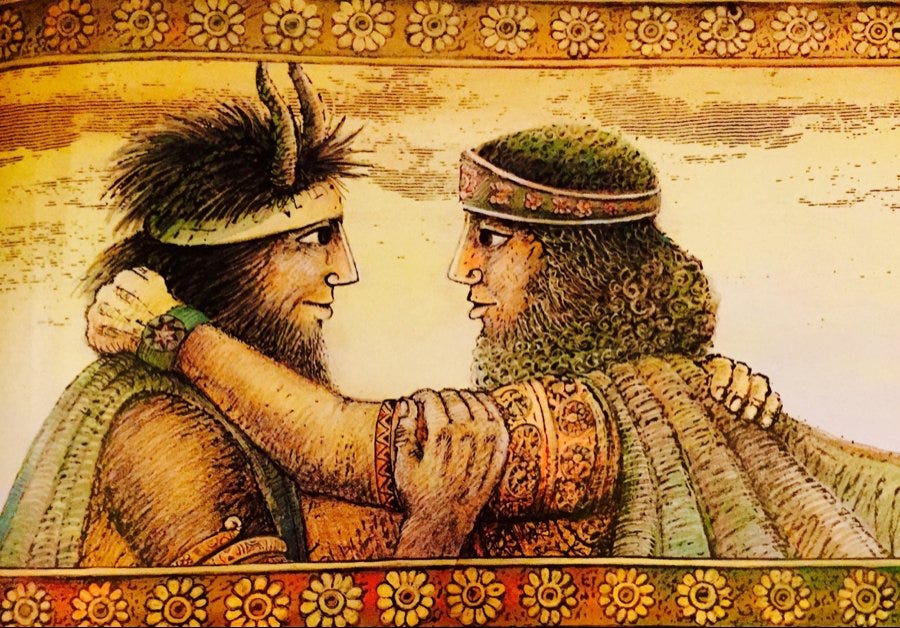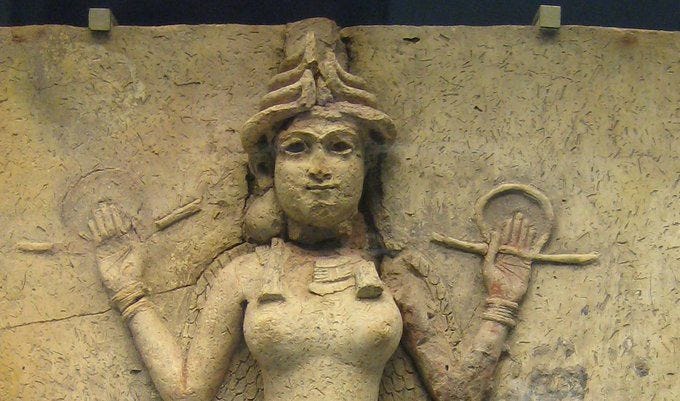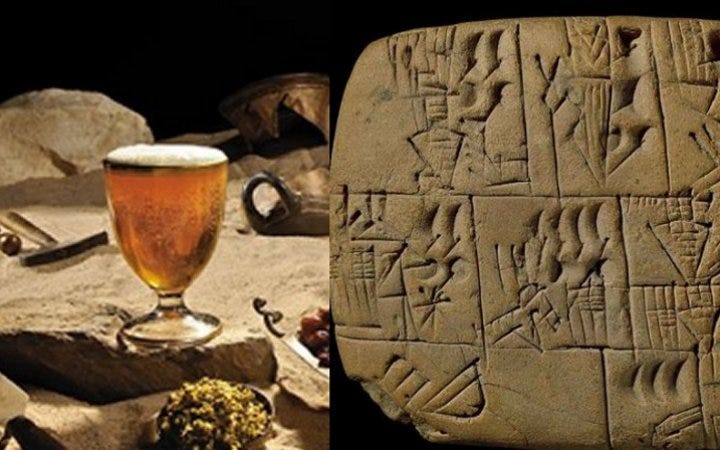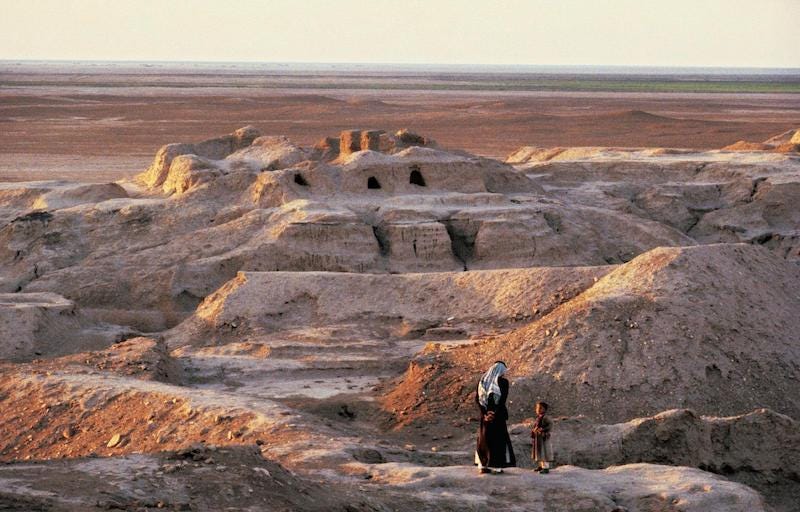I was not prepared for Gilgamesh.
Stephen Mitchell’s new English Version is to the epic what Dr Emily Wilson’s translation of The Odyssey was for it; a wonderful telling that brings life to the ancient tale by digging deep into the words to remove modern prejudices. I can’t recommend it enough.
Gilgamesh is just this guy. A god-king. Okay, two-thirds god, one-third man. (How does that even happen?) He’s awesome. Taller and stronger than everybody else, and he knows it. So he’s kind of a jerk. He treats his people shabbily. Just how is unclear, but he has sex with all the women and, ahem, “wears out the men,” which some translators think must mean that he’s a jock who makes them work out to keep up (oh, the mental gymnastics required to maintain bisexual erasure from history!) So his people beg the gods for a break from his unmatchable sexual appetites, and they send him… Enkidu.
Enkidu is a wildman, as huge and muscular as Gilgamesh, but hairy and uncivilized and so innocent that he may drink alongside the gazelles at the water hole, and run with the lions. He saves the deer from the hunters. Which is how Gil learn of him, when the trapper begs for help, as he can catch no game. And Gil ain’t just a ten foot tall bro with a pretty face, he’s sharp. He asks the priestess at the Temple to Ishtar—aka Inanna, aka Astarte, aka Ashtoreth… I’m gonna call her Asthoreth—to go find this wildman and lay before him, show him your bountiful body and give him the sex he does not yet know. And since priestesses of Ashtoreth give sex to all freely in the name of the goddess, Shamhat goes to do her duty.
And Enkidu likes what he sees. After seven days of lovemaking—Shamhat is both an artist and a professional at her job—Enkidu finally needs rest. And he finds he is no longer an animal-man; the beasts flee from him as they would any human. He understands Shamhat’s speech, and lets her clean and dress and anoint him, civilize him, and bring him back to the City of Uruk.
The bros butt heads at first, but like Cleavon Little and Alex Karras in Blazing Saddles, they become fast friends after Enkidu is soundly whupped. To be fair, Enkidu was ticked off when he heard that Gil was demanding prima noctis from all brides; Enki has a more childlike and innocent sense of indignation about injustice, and Gil is more worldly and angsty; they were the first buddy picture duo and they are amazing.
Now Gil has a friend, and he stops sexing up everyone and exhausting them. The people are happy. Now, let’s take a look at Uruk. Now the modern city of Warka in Iraq, this Sumerian stronghold was the largest city of its kind, where grain was collected from nearby farmers and made en masse into beer, and writing is said to have been invented to keep track of the grain, beer, and whatnot. So there were accountants, who drank a lot of beer, and wrote complaints on clay tablets in cuneiform, which will still have. And when you’re drinking beer and thinking about how awesome life is, you tell stories. So some nameless poet came up with The Epic of Gilgamesh, the origin story for Uruk’s greatest king, who goes on adventures… because he wants to be famous!
I mean. he’s already a two-thirds god-king and leader of Uruk with legs six feet long, but he decides to hunt Humbaba, the great dragon and zealous protector of the cedar forest—that lovely scented wood still treasured today—just so people remember how awesome he is. I’m not making this up, that’s his reason. Humbaba isn’t terrorizing anyone. He’s not evil, only dangerous. Enkidu is the doubting Tammuz here and tries to warn Gil off, but they do it, and win of course, and the Ishtar herself thinks Gil is so awesome that she wants him as her consort. But he knows how that goes. Tammuz was Ishy’s first hubby and she made him take her place in the underworld. And the list goes on. Gil and Enki tell her off, Ashtoreth/Ishtar is rightly insulted, and asks for the Bull of Heaven to grant her revenge.
Do they kill it? Of course they do! They are giants. They bust that bull’s ass no problem. Gil does a victory dance, but Enkidu, perhaps because he was born wild and knows, senses a death curse from the gods for their insolence. (This was before the Greeks invented, and perfected, hubris). Gilgamesh tries to cheer up his friend—who he loves like a wife, by the way, in every translation, so they are way past friends with benefits—but Enkidu suffers for twelve days and dies.
Gil is heartbroken. He refuses to believe it until a worm crawls out Enkidu’s nose. And he is inconsolable. He makes Achilles seem like that widower who remarries way too quick. To be fair, unlike Achilles, he is not a murderous douche, unless you are Humbaba. Instead of rage, he is filled with sorrow and ennui. For what is life, if all of us must die?
The second half of Gilgamesh is about grief. No, really. The grief of being human, of knowing you will die, and of seeing your loved ones die. Gil goes on his greatest quest, to find immortality.
This part is even better. He crosses the Waters of Death in search of the one man who became immortal, Utnapishtim. He must run through the hole in the Earth that the sun burns through when it sets, before it roasts him alive. And in my favorite scene, when he crosses to the other side of the Earth, he finds the tavernkeeper goddess Shiduri serving beer, and telling him his quest is foolish:
Shiduri said, “Gilgamesh, where are you roaming?
You will never find the eternal life that you seek.
When the gods created mankind, they also created death,
and they held back eternal life for themselves alone.
Humans are born, they live, then they die,
this is the order that the gods have decreed.
But until the end comes, enjoy your life,
spend it in happiness, not despair...
Savor your food, make each of your days
a delight, bathe and anoint yourself,
wear bright clothes that are sparkling clean.
let music and dancing fill your house,
Love the child who holds you by the hand
and give your wife pleasure in your embrace. that is the best way for a man to live."
I mean, what’s changed? It applies to all humans. But Gil isn’t ready for that wisdom yet. He goes on to meet Utnapishtim, and his wife, who is also immortal, and never given a damn name. Seriously, I looked. Shameful. But more shameful is that Noah is completely ripped off from Utnapishtim. Gil finds the immortal couple, and Utna tells how they became so.
See, the head god Anu got mad at all the human corruption and decided to flood the Earth to destroy us all. Sound familiar? But Ea, the smartest of the gods, really liked all the libations that worshipers gave the gods, so he told one man to build an ark so many cubits square, and save two of every animal. Ahem. Really.
And for this… the gods granted him (and his wife) immortality. Utna laughs and tells Gil to try to do something as important, and maybe the gods will grant it to him, too. He’s a snarky old dude, he’s lived forever!
And because this is depressing, Utna plays a joke on Gilgamesh for our entertainment. He tells him to stay awake for seven days, to see if he could do something that awesome. And he fails immediately.
He’s bushed from his quest. But Utnapishtim isn’t all cruel. He tells Gilgamesh that at the bottom of the sea, there’s a plant that will grant you youth. (Take that, Ponce de Leon). So he goes looking for it with a boatman, and gets it by tying rocks to his feet and holding his breath. Then he grabs the plant, cuts the ropes, and shoots to the surface!
But Gil isn’t stupid, what if the plant is a trick? He decides to wait until he returns to Uruk, and feed a little to an old man, to see if it works. So he travels back home, and before entering his great city, he decides to wash.
And while he’s taking a bath, a snake eats the plant.
And sheds its skin, leaving it like a scaly middle finger.
So, that’s why snakes can shed their skin, everybody, and why all humans must grow old and die. But here’s the absolute best part.
When the epic begins, we are treated to a nameless poet telling us, how great is the city of Uruk! Look at its walls, its temples, its shiny happy people! And when Gilgamesh comes to the gates with his new boatman pal, he recites the same lines, but from his own mouth.
He was the poet, all along.
And he finally found immortality, by telling a great tale.
Wow, I went on a long time about Gilgamesh, didn’t I? But it’s that wonderful. It completely avoids the hero cycle of the Western tradition. Rather like A Wizard of Earthsea by Ursula K. Le Guin, who ignored Tolkien and told her own story of a young wizard who finds that one’s biggest enemy is themself—and we can’t kill our bad side, but have to live with it—the story comes off as fresh and sparkling, after a thousand tales of the One Man Who Can Save Us. No, this isn’t a story of becoming great, but of how even the greatest will die, and that our quest in life is to live well and love each other, not kill dragons for being dragons.
So, trust me. Read the Stephen Mitchell version of Gilgamesh. I loved it.









This felt like a car ride story in the best way. That illustration, when I saw it posted on IG, is so dear I had to open email to get here and read this. It was a while before I was done looking at the picture. But when I read, you told it like my best teachers taught their subjects. That's Latin class Ides of March bloody sword cake category, through a text medium, without actual cake. That's pretty good.
How strange! I just bought that book 3wks ago and haven’t started it yet. But I definitely will be reading it. Thanks for the essay version.